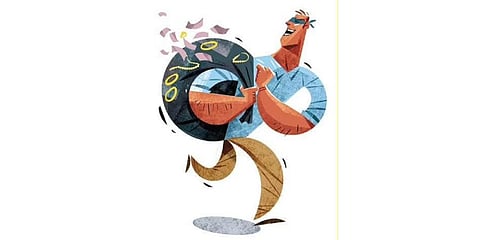

KOCHI: ‘A criminal will always leave behind evidence’ is a maxim that most crime investigators swear by. But what they don’t elaborate on is the hard work that goes into finding this evidence and making them the cornerstones of concrete cases. This is the most challenging aspect of the crime investigation. The investigation into the gold heist from Popular Finance’s Attingal branch in June 2013 posed a serious challenge to the police.
Gold weighing 1.5kg and cash to the tune of about Rs 5 lakh were robbed by a five-member gang wearing masks on a busy Monday morning. Initially, officers stared at a dead end due to a lack of evidence. The CCTV visuals had not given any concrete leads.
Officers were dreading the idea of the case ending up in the cold storage as ‘undetected’ when DySP R Prathapan Nair began sparing a few thoughts about the plastic cable knots used by the gang to tie up the employees.
The knots used was found to be thicker, measuring about 600mm, while the commonly used cable knot in shops measured only 400mm. Nair, now working in the State Crime Records Bureau, said a detailed study was made on the plastic cable knot, which led them to conclude that the ones used in Attingal were imported.
This was the one decisive clue that the police team had been hunting for many days. “Without that lead, the case could’ve ended up in the cold storage,” Nair recollected. He said one of the cops had information about one Jayaprakash, a person hailing from Perumbavoor, getting caught in Saudi Arabia for executing a similar robbery using a plastic cable knot.
It was learnt that Jayaprakash was in Thiruvananthapuram when the theft took place. He had secured release from prison abroad and returned to the state. The plastic knot used in Attingal was found out to be similar to the one used in Saudi Arabia.
The investigators soon connected the missing links and summoned Jaseer, the owner of the goat farm at Palode, where Jayaprakash was working. In the subsequent grilling, he spilled the beans and confessed to their involvement in the crime. The police learned that Jayaprakash was the mastermind, but he could only be arrested a few months later. Ten men were arraigned as accused in the case.
Nair said it was the alacrity of a cop that helped crack the case. “Long before the incident, when a cop was chatting to a person at some public place, Jayaprakash was seen walking by. The person, who knew Jayaprakash, told the cop about Jayaprakash’s past involvement in a criminal case in Saudi Arabia and the modus operandi. That incident remained in the memory of the cop, who conveyed it to Nair when the team grappled for leads.
“That one lead changed the course of the investigation. Further probe clarified that the gang had stayed in a rented house at Venjaramoodu while planning the operation. To give it perfection, they recced the targeted firm for close to a month and then struck,” Nair added.